#arabic folklore
Explore tagged Tumblr posts
Text
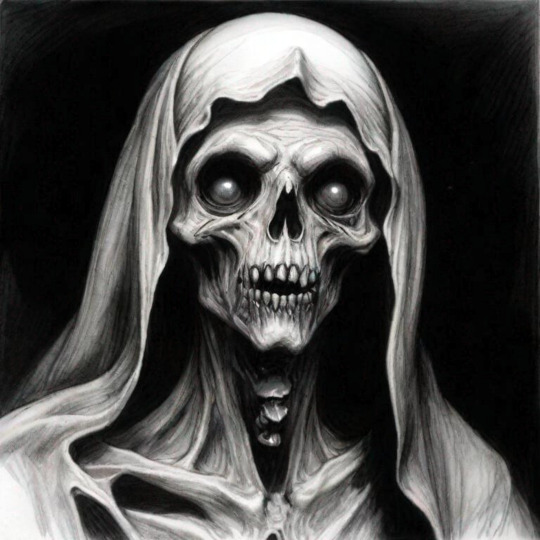
Ghouls were a type of Arabic mythological creature that were hideous wraiths, haunting cemeteries at night, and stalking humans to consume their flesh.
#ghoul#flesh eater#cemetaries#ghouls#ai#arabic mythology#arabic folklore#mythical monsters#myths and monsters#monster art#monsterous#monster#wraith
5 notes
·
View notes
Text
The Stardust Thief- Book Review
The Stardust Thief by Chelsea AbdullahMy rating: 4 of 5 stars Stardust Thief was another one of my “by-the-cover” buys. Absolutely beautiful cover. I couldn’t resist. It went on my never-ending, taller than the Eiffel Tower TBR and that’s where it stayed for over a year. In the meantime I was one of the authors participating in a signing that Ms. Abdullah was also part of, so of course I had to…

View On WordPress
#40 Thieves#arabic folklore#Arabic mythology#book critique#book recs#Book reviews#books#fairytales#fantasy#fiction#reading
1 note
·
View note
Text

Emirati women in traditional dress and jewelry, 1930s
#photography#history#culture#traditional clothes#vintage#vintage photography#anthropology#gulf arab#arabian#arab#arabic#united arab emirates#khaleeji#traditional costume#traditional clothing#traditional dress#traditional#folk fashion#folk costume#folklore
99 notes
·
View notes
Text

Djinn Jester the shapeshifting trickster
#ai#aiart#ai art#tentacles#jester#jinn#djinn#genie#arab#arabic#arabian#myth#legend#folklore#lore#supernatural#trickster#psychedelic art#surreal art#trippy art#neon art#fantasy art#magical creatures#magical#fantasy#tentacle
29 notes
·
View notes
Text
Once upon a time
Everyone knows once upon a time, but did you know that countless cultures have their variation of how classic stories begin, and one one from Welsh is, "A long time ago," similar to a few others from other cultures that go, "A long long time ago."
But, some, like Lithuanian go: "Beyond nine seas, beyond nine lagoons," similar to the Czech, "Beyond seven mountain ranges, beyond seven rivers."
These are some variations from Arab texts: This happened or maybe it did not. The time is long past and much is forgot.
There was or there was not—is anything sure or certain but the greatness of Allah?—a king so powerful that man and Djinn bowed before him.
This is how many Hausa tales are begun “A story, a story. Let it go, let it come.”
And of course, we have one that is a combination and modern invention that has become part of media culture and storied greatness: "A long time ago in a galaxy far, far away." <3
These are just some. But it's been among the most wonderful part of my research before I began putting down the first words for Tales of Tremaine. But the art of storytelling is one of the most human things there is. It's central to us, and it has passed long and far by tongue and time over lands and through cultures. Some beginnings are so similar to each other, some not so much.
But then you see the threads between them in the stories, the themes, tropes, archetypes, motifs. But the traditions span the world. They are old. They are cool. And they are beautiful.
And storytelling is one of the gifts that connects us all, like music, and other arts.
#once upon a time#how stories begin#Lithuanian#Czech#arabic#Hausa tales#welsh folklore#European lore#world folklore#in a galaxy far far away#art of storytelling#storytelling#storytelling techniques#stories#djinn#archetypes#what about your culture#did i miss anything#what did I miss#add your own#add your own thoughts#folklore#myths and legends#folktales
159 notes
·
View notes
Note
Hi. Not sure if you've answered this before, but do you have a list of books to recommend on fairytale/mythic analysis?
So I finally have a real response to this question, but it's LONG, be warned:
First, it depends what you want to get out of your folklore study, what lens you'd like to use for analysis. And second, it's important to know that the practice of folktale analysis has changed over time, especially in the last ~15 years or so as the scholarly consensus has evolved toward decolonization.
For example, the common historical starting place was Bruno Bettleheim's The Uses of Enchantment. Candidly, I haven't read it yet for a few reasons: 1) It focuses fairly exclusively on Western European fairy tales like those of Grimm, Basile, and Perrault. 2) It assumes the primary audience for such tales are children. 3) It's a white man's perspective, and there are already enough of those to go around. That said, it's considered a foundational text for folklore study, so I'll probably get to it eventually. There are some modern authors who might be considered scholarly successors of Bettleheim, like Maria Tatar. I haven't read her books yet but I know she's also a powerhouse of Western fairy tale analysis.
Some other popular perspectives include the works of Carl Jung and his protégés in psychoanalysis, Marie-Louise von Franz and Erich Neumann. These are wonderful sources for learning about depth psychology and the universal unconscious which causes certain motifs to recur in storytelling across the globe and over centuries. Another popular author in this field is Robert Bly, who dove deeply into the concept of the Shadow as it appears in folk tales.
But for me, my favorite sources have been a collection of feminist authors who were active in the late 80s and early 90s, notably Barbara Fass Leavy and the incomparable Clarissa Pinkola Estes. While their work is pretty firmly grounded in second-wave feminism and therefore not very intersectional as we understand it today, they were the first to begin exploring interpretations of folk tales outside of a patriarchal context. I personally refer to Leavy's In Search of the Swan Maiden and Estes' Women Who Run With the Wolves more than any other books.
A lot of the most current perspectives are only accessible via blogs, like Jeana Jorgensen AKA The Foxy Folklorist, who often explores fairy tales through a Queer lens. Another brilliant voice working today is Helen Nde of Mythological Africans, who is doing the long-overdue work of decolonizing African folklore.
And while all these sources will help you develop a framework for analysis, still one of the best things you can do is read the tales for yourself. One of my favorite series is that of Heidi Anne Heiner of Sur La Lune Fairy Tales, who has amassed impressive collections of folk tales of the same type from around the world, making comparison easy. She also provides excellent footnotes that offer context to the versions and translations she's selected, and every tale has a source.
Outside of that, I like to read regional collections from indigenous scholars and native speakers: some editors will even include a copy in the original language along with the English translation, thus allowing others to "check their work." One of my favorite folkorists like this is Inea Bushnaq, who collects Arab folktales and again provides accessible cultural context. It's important to remember that most oral folktales which are now available in English were first recorded by colonizers, so the versions we have may be edited, mistranslated, or even maliciously altered to suit Western tastes. This is why seeking out versions from actual members of indigenous communities is critical.
Right now, I'm reading The Japanese Psyche: Major Motifs in the Fairy Tales of Japan by Hayao Kawai, and I'm next going to try Oral World and Written Word by Susan Niditch. I tend to just go where the spirit moves me, journal a bit, go down a research rabbit hole about a particular topic... it's fun. But whatever you're looking to get out of your folk tale study, rest assured you will never run out of material!
#folklore#folk tales#fairy tales#mythology#bruno bettleheim#maria tatar#carl jung#marie louise von franz#erich neumann#robert bly#clarissa pinkola estes#barbara fass leavy#jeana jorgensen#foxy folklorist#helen nde#mythological africans#african folklore#inea bushnaq#arab folklore#japanese folklore#depth psychology#comparative mythology#jungian shadow#jungian psychology#sur la lune fairy tales#heidi anne heiner#brothers grimm#charles perrault#giambattista basile#asks
43 notes
·
View notes
Text

Fred Fields, "Land of Fate"
#fred fields#fantasy art#flying carpet#arabesque#towers#city art#arab folklore#fantasy cities#magic carpet#fantasy#fantasy world
8 notes
·
View notes
Text

Zarqa's Caravan Girl Lines by Darya color by me
#artists on tumblr#concept art#arab futurism#arab mythology#zarqa al yamama#concept artist#painting#digital painting#arab folklore
7 notes
·
View notes
Text


Tunisia, Sidi Bou Saïd on (date unknown)
مش عم بتروحي من بالي
#tunisia#sidi bou said#harissa#tunisienne#carthage#monastir#maghreb#Tunisia diaries#Maghreb Heritage#mediterranean#desert folklore#arab art#Esmaavd
13 notes
·
View notes
Text
LOULIYYA, DAUGHTER OF MORGAN
@hamlet-macbeth-othello
@softlytowardthesun @adarkrainbow @natache @grimoireoffolkloreandfairytales @professorlehnsherr-almashy @themousefromfantasyland @the-blue-fairie @tamisdava2 @faintingheroine @princesssarisa @angelixgutz @amalthea9 @allthegoodbobdylanlyricsaretaken @thealmightyemprex
(A folktale from Egypt)
ONCE THERE WAS a king and his wife who did not have any children. One day the queen prayed to God, “Oh God, my God, who hears my prayers, be kind to me and grant me a child. I will name him Yousif.” She made a nadr:
“If I have a child, I will make three wells and fill them, one with honey, one with butter, and one with rosewater.”
Time passed. One day went and one day came, and she became pregnant. She had a boy whom she called Yousif.
The king and his wife almost flew with joy. One year after another, Yousif grew up, and he was going to school.
With time, while the king was asleep he heard a hatif saying, “King, fulfill your pledge. Fulfill the pledge that you owe.”
This happened three times. Every time the king forgot. Yousif became ill.
They got him all the kingdom’s doctors and the sheiks. No one could cure him. Finally they said, “Maybe there is an unfulfilled pledge. Think! Have you made a pledge, king?”
The king and the queen remembered their promise. Immediately the king ordered that three large wells be dug and lined with china tile and filled to the top - one with honey, the second with butter, and the third with rosewater.
And he dispatched a crier to announce in town, “Oh God’s people, people of this town, he who wants honey, butter, and rosewater should come tomorrow to the king’s palace.”
That was it. With the appearance of the morning star, everyone in town was rushing to the king’s palace. This one carrying a saucepan, that one carrying a wash tub, and this one and that one! They clustered around on the three wells, and almost immediately they were empty. After a short while there was nothing at all. A while later, an old woman came leaning on a cane. She had three cans on a tray which she carried on top of her head. When she found that the wells were empty, she took out a little piece of sponge and began sponging the drops off the walls of the wells. After a very long time, she had hardly filled her three small cans, and she turned back to go home. Now the king’s son, Yousif, was playing with his ball. He threw his ball like this-and it hit the old woman. She fell on the ground, and everything was spilled.
Yousif ran to her and said, “Never mind, old mother. I am wrong.”
The woman answered, “With what can I curse you? With what can I curse you, son? You are too young. I am going to curse you with Louliyya, daughter of Morgan,” and she left.
He went to his father and mother and asked them, “Who is Louliyya, daughter of Morgan?”
They answered him, “Son, you are too young. You should have nothing to do with these things.”
Everytime he asked someone, the answer was, “You have nothing to do with these things.”
Finally an old servant said to him, “She is a beautiful girl that you have to find yourself.”
That was it. He went to his mother and father and said, “Prepare rations for me. I’m going out into the world. I have to find Louliyya, daughter of Morgan.”
When they heard this, their hearts sank to their toes. They kept on crying and imploring him, “Don’t do this, son. Stay away from her. No one has gone to find her and come back. We have no one else but you.”
He answered them, “It is no use.”
He finally took a horse, food and water, and some money and left.
He kept on moving from God’s countries to God’s peoples. One town carried him, and another town put him down, until the inhabited part of the world ended. He kept on traveling in the desert.
After a while, he saw dust coming from a distance. It came closer and closer. He looked to find a ghoul coming toward him. The moment the ghoul was by his side, he greeted him, “Peace be upon you, father ghoul.”
The ghoul answered, “Had your greeting not preceded your speech, I would have devoured your flesh before gnawing on your bones. What do you want?”
He answered, “I’m looking for Louliyya, daughter of Morgan.”
The ogre said, “Son, keep on going. You will meet my brother. He is one day older than I am and a year more knowledgeable.”
Yousif kept on going until he saw another cloud of dust, larger than the one before it. It came closer and closer, and finally when the ghoul was next to him, he said, “Peace be upon you, father ghoul.”
The ghoul replied, “Had your greeting not preceded your speech, I would have devoured your flesh before gnawing on your bones. What do you want?”
He replied, “I want to know how to reach Louliyya, daughter of Morgan.”
The ogre said to him, “Keep on going. Ahead you will meet my brother. He is one day older than myself and a year more knowledgeable.”
He kept on going until he met the third brother. He was much larger and much more fearsome than the first two. Yousif said to him, “Peace be upon you, father ghoul.”
The ghoul replied, “Had your greeting not preceded your speech, I would have devoured your flesh before gnawing on your bones. What do you want?”
He replied, “I want to know how to reach Louliyya, daughter of Morgan.”
The ghoul said, “Ahead of you you’ll find my sister, and she is the only one who can tell you how to reach her. When you get there, if you find her with her red chicks around her and her hair combed and groomed, don’t you dare say a word or make her feel your presence; but if you find her with her hair messed up and her green chicks around her and her breasts thrown over her shoulder you can talk to her, for she is going to be in a good mood.”
Yousif left and kept on going and going.
When he reached the ghoula’s house, he hid and peeped. He saw that her hair was well groomed and her red chicks were hopping up and down around her. He did not say a word and remained in his place.
After a while, about sunset, she messed up her hair and started catching her red chicks and eating them.
She let out her green chicks from the pen and threw her breasts behind her back and started singing. Yousif tiptoed behind her. The chicks saw him and shouted, “Somebody’s coming!” but she was singing so loudly that she did not hear them.
Of course she was in a good mood. When Yousif reached her, he suckled each of her breasts once. She shouted, “Ahhh, now you are my ‘milkson.’ You suckled my right breast, you became like my son Isma‘Aeen; you suckled my left breast, you became like my son ‘Aabdel-‘Aal! What do you want?”
He said, “Louliyya, daughter of Morgan.”
She said to him, “Why, son? You are too young to die.”
Even if his head was against a thousand swords, he insisted and said, “Never! I have to find Louliyya, daughter of Morgan.”
She said, “Well, take this ball and this racket. Hit the ball with the racket, and wherever the ball goes, you follow it. They will take you to the place you want to go.”
That was it. Yousif got back on his horse and struck the ball with the racket.
The ball flew into the air, landed on the ground, and kept on rolling. Mounted on his horse, Yousif followed it.
He kept on hitting the ball and running after it, hitting the ball and running after it, hitting the ball and running after it.
Hit and run, hit and run, hit and run, until finally he found himself in front of a huge palace in the middle of the desert.
This palace was high, high, high; it had neither windows nor gates. He went around it, and finally he saw one small window at the top of the palace.
As he stood wondering about this palace and thinking who it might be who owned it, he saw a huge dust cloud coming from far, far away.
He heard a dog barking and a big commotion. He hid himself behind a big boulder and peeped out. He saw an ghoul much larger than all the ghouls he had met.
The ghoul came to the palace and shouted, “Oh Louliyya, daughter of Morgan, let down your long hair and take your father the ghoul away from the heat of the hills.”
Yousif saw the little window open, and out of it appeared a young woman whose beauty was indescribable. Glory be to the creator for his creation!
She swung her hair out of the window, and it came down until it reached the ground. Her father the ghoul climbed up on her hair.
Pull, pull, pull, he was up there. He got in, and the window was closed. When he got inside, he asked her, “What have you cooked for us today?”
She said, “Such-and-such,’’ and served him what she had cooked.
He ate, and after that he rested his head and went to sleep. Now to whom do we return?
To Yousif outside! He kept himself hidden until the morning of the following day.
The window opened, and the hair was let down from it, and the ghoul climbed down on Louliyya’s hair. Yousif waited until the dust disappeared. He came out of his hiding place and shouted, “Oh Louliyya, daughter of Morgan, let your long hair down and take Yousif, for whom you have been predestined, away from the heat of the hills.”
The window was opened, and he looked up and saw her looking down. When she saw him, her heart softened for him; she fell in love with him. She said to him, “What brought you here? Get away with your skin still on your body! For if my father sees you, he will kill you and drink from your blood”’
He said to her, “Before I go, lift me up, and I will tell you my story.”
She swung her hair out, and he climbed up. He told her his story from hello to good-bye and said to her, “You are predestined for me, and we must get back to the house of my father and mother. We must escape from here.”
She said to him, “Escape to where? The distance we could cover in a day my father the ghoul will cover in one step.”
As they were talking, they heard a big commotion and heard her father shouting, “Oh Louliyya, daughter of Morgan, let your long hair down and take your father away from the heat of the hills.”
She was frightened and said, “What a catastrophe! My father the ghoul is back. Where shall I hide you/! Where shall I hide you/!”
She transformed him into a pin and pinned it on her chest.
When her father came up, he asked her, “What took you so long?”
She said, “Nothing; I was just in the bath.”
The ghoul started sniffing around, saying, “I smell the trace of a human not of our race.”
She said to him, “There is nothing.”
He looked all over the place and did not find anything. He asked for his food, and after he had eaten, he went to sleep. The following day the ghoul left as usual.
As soon as he was gone, she pulled the pin out of her collar; it became Yousif.
She said to him, “We must go now!”
She got some henna and tinted everything in the house with rose coloring. She overlooked only one thing, the tambourine. It hid from her underneath the sofa. She took her comb, her sewing needle, and her mirror, and she went out with Yousif.
When her father the ghoul returned, he started calling “Oh Louliyya!”
Nobody answered.
“Oh Louliyya!”
Nobody answered. Finally, when he became impatient, he started calling on everything in the house. “Oh chair!”
The chair said, “She is sitting on me!”
“Oh bed!”
The bed answered, “She is sleeping in me!”
“Oh bathtub!”
The bathtub answered, “She is bathing in me!”
Finally the tambourine started dancing and singing.
“Tumm ti dum, tshshsht, tshshsht, Tumm ti dum, tuu, tuu, Yousif took her and flew! Tuu, tuu, Yousif took her and flew.”
That was it. The ghoul heard this, and he went mad. He got his dogs to sniff around, and they flew after them.
Now we return to whom? To Yousif and Louliyya. They kept on going until they finally saw the cloud of dust coming from afar.
It kept on getting bigger and bigger until it blocked the sun; it was just like nighttime. Louliyya took out her needle and threw it back over her shoulder. Immediately it became a field of thorns.
The ghoul and his dog went right through it; the thorns pierced their feet. The ghoul kept saying to his dog, “Pluck out, my dog, and I’ll pluck out with you. Pluck out, my dog, and I’ll pluck out with you.”
Meanwhile Yousif and Louliyya were far away.
After a little while the ghoul drew very near to them again. Louliyya threw her comb back over her shoulder. Immediately the comb became a thick hedge of bamboo.
They got lost in it. The ghoul kept saying to his dog , “Chop down, my dog, and I’ll chop down with you. Chop down, my dog, and I’ll chop down with you.”
Yousif and Louliyya got a little bit farther away from them. Again the ghoul drew very close to them. Louliyya threw her mirror back over her shoulder. Immediately it became a lake.
When the ghoul got to it, he and his dog started drinking it. The ghoul would say, “Drink, my dog, and I will drink with you. Drink, my dog, and I will drink with you.”
They kept on drinking and drinking and drinking until they exploded. Before the ogre died, he threw some pins at them. As soon as the pins struck them, Louliyya became a she-dog, and Yousif became a lark.
He flew away. Louliyya kept on going until she reached Yousif‘s parents. She lay down in front of the doorstep and kept on barking.
No one paid any attention to her.
Yousif kept on coming back and hovering over the house and singing, “How are you, how are you, Louliyya, in the house of my father and mother?”
Louliyya would answer back, “Over me is dust, underneath me is dust, just like a dog’s place of rest, Yousif!”
One day Yousif's mother heard her saying, “Yousif.”
She and Yousif‘s father had become blind from crying over their son. She asked the dog, “What did you say?”
It repeated what it had said. Yousif‘s mother took her inside and made a bed of straw for her in the stable.
The following day Yousif hovered over the house singing, “How are you, how are you, Louliyya, in the house of my father and mother?”
She answered back, “Over me is straw, and underneath me is straw, just like a mare’s place of rest, Yousif.”
Yousif‘s mother heard this, and she said to herself, “Something must be the matter with this dog.”
She took her upstairs and put her in a room with a bed with silk sheets and covers. The following day, when Yousif hovered over the house singing, “How are you, how are you, Louliyya, in the house of my father and mother?” she replied, “Over me is silk, and silk is underneath me, just like a prince’s place of rest, Yousif.”
Yousif‘s mother was listening this time. She heard the whole thing. She entered the room and called the dog to her. It went to her. She kept on feeling its body and caressing it with her hand.
As she was passing her hand over its head, she found three pins pierced deep in it. She pulled them out, and immediately, with the omnipotence of the Omnipotent, she became a beautiful young lady again.
She told Yousif‘s mother and father about all that happened, how her father imprisoned her, how Yousif came to her-everything that happened. She said to them, “Get me some sugar, and I will get Yousif back.”
“How?” they asked her.
She answered, “Just wait and see.”
The following morning Yousif came back hovering over the house and said, “How are you, Louliyya, in the house of my father and mother?”
She said, “I have some sugar for you,” and she put her hand with granulated sugar in it out the window.
The lark perched on the palm of her hand to have some sugar. Ooops! She caught it! She found three pins stuck in its head. As soon as she plucked them out, the lark-with God’s omnipotence-became Yousif again.
He went and embraced his father and mother; their sight was restored by God’s will.
Yousif and Louliyya got married! The celebration lasted for forty days and forty nights.
They lived in stability and prosperity and begat boys and girls.
Now toota, toota, the tale is over. Was it sweet or dragging? If sweet, you owe a song, if dragging, you owe a story.
#arabic#egypt#fairy tales#folktales#folklore#fantasy#literature#maiden in the tower#magic flight#rapunzel
10 notes
·
View notes
Text

@ Sam
#litography#illustration#ilustrator#czech ilustrator#book design#book ilustration#traditional art#printmaking#traditional printing#printing techniques#dark ilustration#folklore#arabic#arabic art#traditions#islamic art
6 notes
·
View notes
Note
what is that djinn who pretends to be a boatsail? :O you can not find a lot about djinn online, only same 3 to 4 types plus DnD contamination :(
Ohoho you’re asking about Khattaf Raffay (خطّاف رفّاي)!
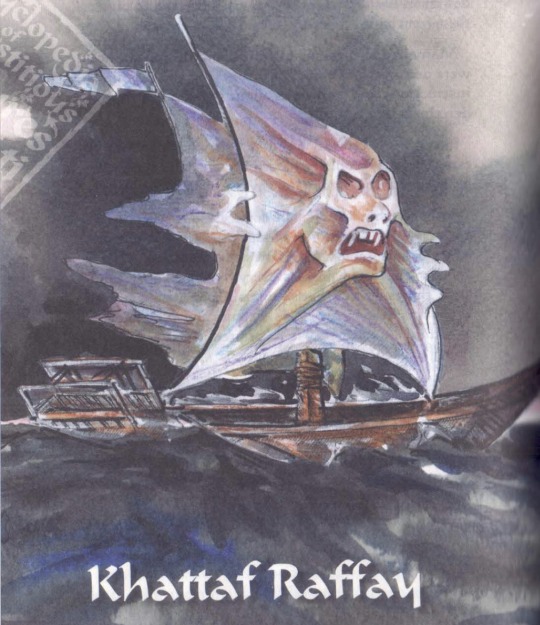
His name has some weird derivations online, but its real origin is from the up and down movement of a sail (يخطف و يرفي, yakhtuf wa yarfi). So you could roughly say it means “he who flaps like a sail”.
He looks like a great white triangle sail, sometimes with a boat attached; it is also unclear whether he wears the sail or is the sail. He haunts the sea where the water is deepest. He crashes down on ships and breaks them in two, or leads them astray until they are lost at sea. On land he is less dangerous but no less terrifying.
Fortunately for everyone, he’s cleaned up his act enough that he is now the star of an Emirati children’s book, where he’s not evil, just misunderstood!
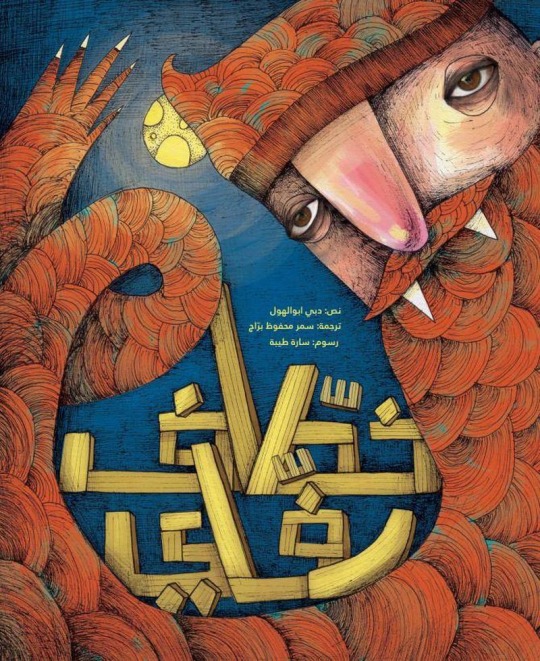
Reference and image
al Musallam, A. (2017) Emirati Superstitious Creatures. Sharjah Institute for Heritage, Sharjah.
#khattaf raffay#jinn#jinni#united arab emirates#emirati superstitious creatures#emirati folklore#arabian folklore
50 notes
·
View notes
Text
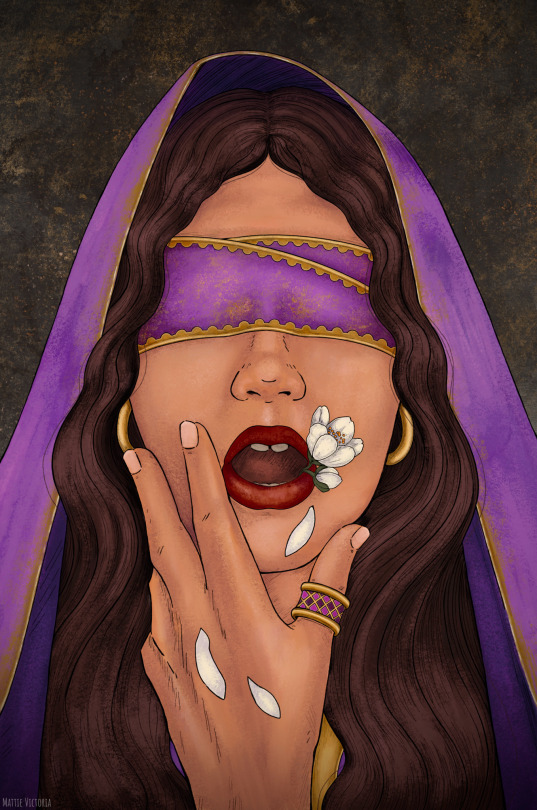
I wasn’t feeling well yesterday so I’m posting this today— my entry for Folktale Week Day 1: Lost. I chose the Iraqi folktale The Girl Who Spoke Jasmines and Lillies, about a young woman born with many enchanting gifts— one of which allows jasmines and lilies to blossom from her lips every time she speaks. Despite losing her eyesight to her jealous aunts and cousins, the protagonist of the tale is still able to ultimately marry the prince to whom she was originally betrothed to with the power of her gifts.
10 notes
·
View notes
Text

Divs (or Devs) originate in Ancient Persian mythology, and were adopted and adapted by many later cultures. They are usually described as monstrous humanoids with enormous strength, magical powers, and frequently a taste for human flesh.
#divs#mythical creatures#mythological creatures#mythology#arabic#myth and folklore#demons#chthonic#chthonic beings
6 notes
·
View notes
Text
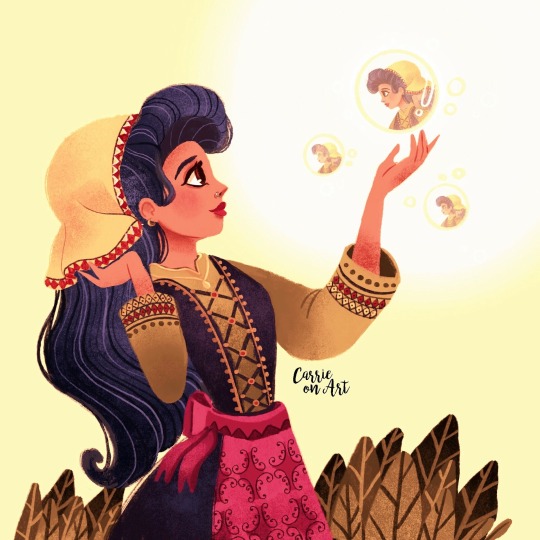
Cinderella by Carrie On Art
#Carrie on art#Cinderella#fairy tales#arab Cinderella#art#artwork#folklore#princesses#princess cinderella#fairy tale art#fantasy#children’s stories#illustration#fairytale#fairy tale illustration
14 notes
·
View notes
Text
Calling Tolkien nerds - curious about something: Reading over texts and came across:
"All except the Witch-king were apt to stray when alone by daylight. And all, but the Witch-king, feared water, and were unwilling but in dire need, to enter or to cross unless dryshod by a bridge."
We know the Nazgul can/do walk in daylight, just not much, and that their powers are at least diminished by it.
"Of Khamûl it is said here that he was the most ready of all the Nazgûl, after the Black Captain himself, to perceive the presence of the ring, but also the one whose power was most confused and diminished by the daylight."
Unfinished Tales, Part 3, Ch 4, The Hunt for the Ring Notes 1
What inspired this I wonder though? Not crossing moving waters is a theme common in many a monster/demon myth from cultures, same with sunlight hurting monsters/demons - I'm wondering if there is any specific lore Tolkien drew from (creature specifically) on/for that one. Don't just say Norse - no shit. The Hobbit is Beowulf.
Not my point. I've gone into the etymology of Nazgul before and the Arabic ghul, as well as other sources.
But, just curious on that. Maybe it's a shot in the dark.
#tolkien#Tolkien nerds#nazgul#nazgûl#witch king#monsters#demons#myths#myths and legends#folklore#lore#book lore#lord of the rings#lotr#the hobbit#the silmarillion#storytelling#writer asks#ghul#arabic ghul#I've got a question#does anyone know#just curious#ask tumblr#book worms#books and reading
28 notes
·
View notes